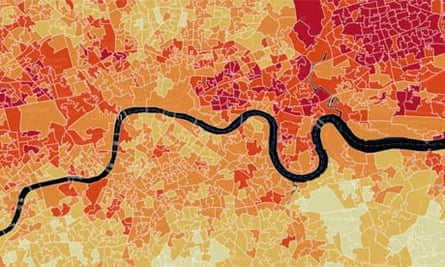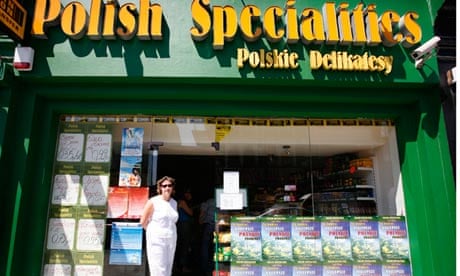Polish is now the main language spoken in England after English, according to 2011 census data released by the Office for National Statistics on Wednesday.

The first ONS language figures, recorded from a survey of 56.1 million residents of England and Wales, show 546,000 speak Polish. There are still slightly more Welsh speakers in Wales at 562,000.
The statisticians recorded more than 600 different responses to the question “what is your main language”, including different languages and dialects. They grouped these into more than 104 different languages or language groups and identified 49 main languages that have at least 15,000 speakers.
Of residents of England and Wales aged over three, 4.2 million, or 8% of the total, had a main language other than English.
After English, Welsh and Polish, the next biggest languages in England and Wales were the Indian and Pakistani languages of Punjabi, Urdu, Bengali (including Sylheti and Chatgaya) and Gujarati which taken together account for close to a million people.
They are followed by Arabic, French, Chinese and Portuguese. The majority of the 141,000 Chinese speakers in England and Wales do not count Mandarin or Cantonese as their main language but one of dozens of regional dialects such as Hakka and Hunanese.
The fine grain of the data makes it possible to find out who speaks what in your postcode and where language groups are gathered. The highest concentration of Gujarati can be heard in Leicester, Cantonese and Mandarin in Manchester, Lithuanian in Boston in Lincolnshire, Punjabi in Slough in Berkshire, and Somali in Brent, north-west London.
You are most likely to hear English spoken in Redcar and Cleveland in the north-east where it is the main language for 99.3% of people. Swedish was the smallest of the main languages, but speakers of the smaller languages can find themselves in a tiny minority.
There was only one person in Barnet and one in Bexley who said they spoke Caribbean creole. In England and Wales 629 people speak Romany, 58 speak Scottish Gaelic, while 33 said they speak Manx Gaelic – making it the smallest language grouping.
Academics believe the breadth of languages being spoken in England and Wales may start to change the English we speak, most rapidly in areas where people have the most contact with foreign language speakers.
“We are more likely to pick up words than change accents as we find foreign words that fit much better and work better,” said Oliver Mason, lecturer in English linguistics at Birmingham University. “Vocabulary may be the main area of change.”
Hindi words such as pundit, pukka and pyjamas have long been adopted into English but the relationship works the other way too with Poles, for example, noticing how friends returning from England are inflecting their conversation with English words in hybrid known as “Ponglish”. People will go “szoping” for clothes and buy a “tiszert”.
The growth of Polish may be slowing, however, judging by net immigration figures showing a decline in the rate of increase in long-term British residents from the eight eastern European countries that joined the EU in 2004, of which Poland is the largest.
The language data was also taken as evidence that immigrants may have a greater sense of belonging than government ministers, keen to cut net migration, have suggested.
The census revealed that 13% of the population was born abroad, but only 138,000 people, less than 0.5% of the population, could speak no English at all and in total only 1.6% of residents could speak it not well or not at all.
This contradicts a statement by Eric Pickles, the communities secretary, who said in a recent speech that the UK was in an “incomprehensible situation where no one can speak English as their main language in 5% of our households” and this was “terrible for community relations”.
One million households have no residents with English as a main language, although most had some proficiency in English, the ONS said.
Dr Stephen Jivraj, researcher at the University of Manchester’s Centre on Dynamics of Ethnicity, said: “In policy debates, immigration is a proxy not only for being born outside the UK but also for other concepts such as not belonging, with family origins outside the UK and requiring services to help integrate.
“These concepts are measured by combinations of language, citizenship, national identity and ethnicity better than by birthplace.”
Chinese people alone listed 67 different languages or dialects, although a minority of those were different spellings of the same language.
All but three of the London boroughs, excluding the City, Richmond and Havering, have residents speaking more than 100 main languages, the ONS said. Hillingdon is the most linguistically diverse, with 107 languages listed, followed by Newham, with 103.
“The West Midlands is the region with the lowest percentage of people who can speak English very well or well, at 72%” said census director Roma Chappell. It is also the region that has the highest number of people who cannot speak English at all.
Spokes people
More than 762,000 people now cycle to work in the UK, with the number doing so in London having doubled to 161,000, up from 77,000 in 2001, according to the Office for National Statistics. The student cities of Oxford and Cambridge appear to be the most bike-friendly with 18% and 10% of residents cycling.
The capital’s cycling hotspot is Hackney where 9% of residents cycle to work, more than the 7% who drive. But less than 2% use bikes in Newham, Barnet and Hillingdon.
Across England and Wales cars are by far the most popular way to commute, with 15.3 million people driving, 4.8 million using public transport and 1.4 million working at home. Norwich and Exeter have the most pedestrian commuters, with 15% walking to work.


Comments (…)
Sign in or create your Guardian account to join the discussion